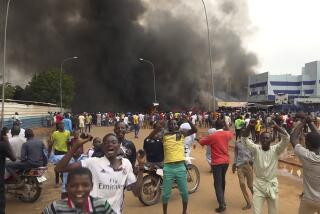France Refrains From Urging Mobutu to Quit
- Share via
PARIS — As pressure mounts from Washington to Brussels for Zaire’s President Mobutu Sese Seko to quit, only France, which has major economic interests in Central Africa, has not joined the chorus.
On Friday, Foreign Ministry spokesman Jacques Rummelhardt called on Mobutu, one of Africa’s longest-ruling dictators, to hold talks with Laurent Kabila, whose rebel forces have been gobbling up Zairian territory and are demanding that the 66-year-old president resign by Sunday.
Such talks would “facilitate a peaceful solution,” Rummelhardt said.
“He [Mobutu] is there. He is president. There is a government,” another French official insisted.
In stark contrast, the day before, Foreign Minister Erik Derycke of Belgium, Zaire’s former colonial ruler, said flatly, “Mobutuism has no future, and now we have to see how to get to a transitional government.”
On Wednesday, the White House said Mobutu’s reign, on which it lavished billions in aid during the Cold War, was “about to become a creature of history.”
But the most the French are now admitting publicly is that neither of the parties vying for control of a country a quarter of the size of the United States is an ideal head of state.
Isolated in expressing support of any kind for Mobutu’s 32-year-old dictatorship, which has been disgraced by extensive human rights violations, mutinies, separatist wars and alleged plundering of the national wealth on a colossal scale by the president and his cronies, the French are haunted by the fear that the steady rebel advance over the last six months could kindle unrest in neighboring countries. Many of those nations are former French colonies or have economic links with France.
Among them are Gabon and Angola, both petroleum-rich.
“It’s the African version of the domino theory,” a U.S. diplomat said. “They [the French] don’t want to allow the example in Central Africa of a rebel leader coming out of the forest and toppling a government.”
*
So rather than forcing Mobutu from the position he has held since leading a coup d’etat as army commander in 1965, five years after the former Belgian Congo was granted independence, the French contend that he can still play an important role in smoothing the way to Paris’ avowed goal for Zaire: free and fair elections that would allow a peaceful and orderly transition to the apres-Mobutu era.
The most likely alternative to the ballot box--a pitched battle between the demoralized remnants of Mobutu’s Armed Forces of Zaire and Kabila’s fighters for Kinshasa, Zaire’s capital of 5 million people that has already been rocked by riots--could have calamitous side effects for the region. These include the spread of unrest across the Congo River to Brazzaville, capital of the former French Congo, on the north bank.
More generally, the rebels’ takeover of about a third of the sprawling, resource-rich nation is painfully perceived in Paris as further proof of waning French influence on a continent where it was once a major player. France still keeps 7,000 troops there.
The Zaire crisis has been a “triple failure”--tactical, moral and geopolitical--for France, former French Defense Minister Francois Leotard lamented. The major beneficiaries, the center-right politician claimed, were “the Americans and the countries of English-speaking Africa.”
On the other hand, Stephen Smith, a well-known journalist on African affairs for the Paris newspaper Liberation, believes that France has been a loser in Africa because it still relies too heavily on aging leaders like Mobutu--at a time when democratic yearnings, sparked by the peaceful triumph of majority rule in South Africa, have been sweeping the continent.
More to Read
Sign up for Essential California
The most important California stories and recommendations in your inbox every morning.
You may occasionally receive promotional content from the Los Angeles Times.













